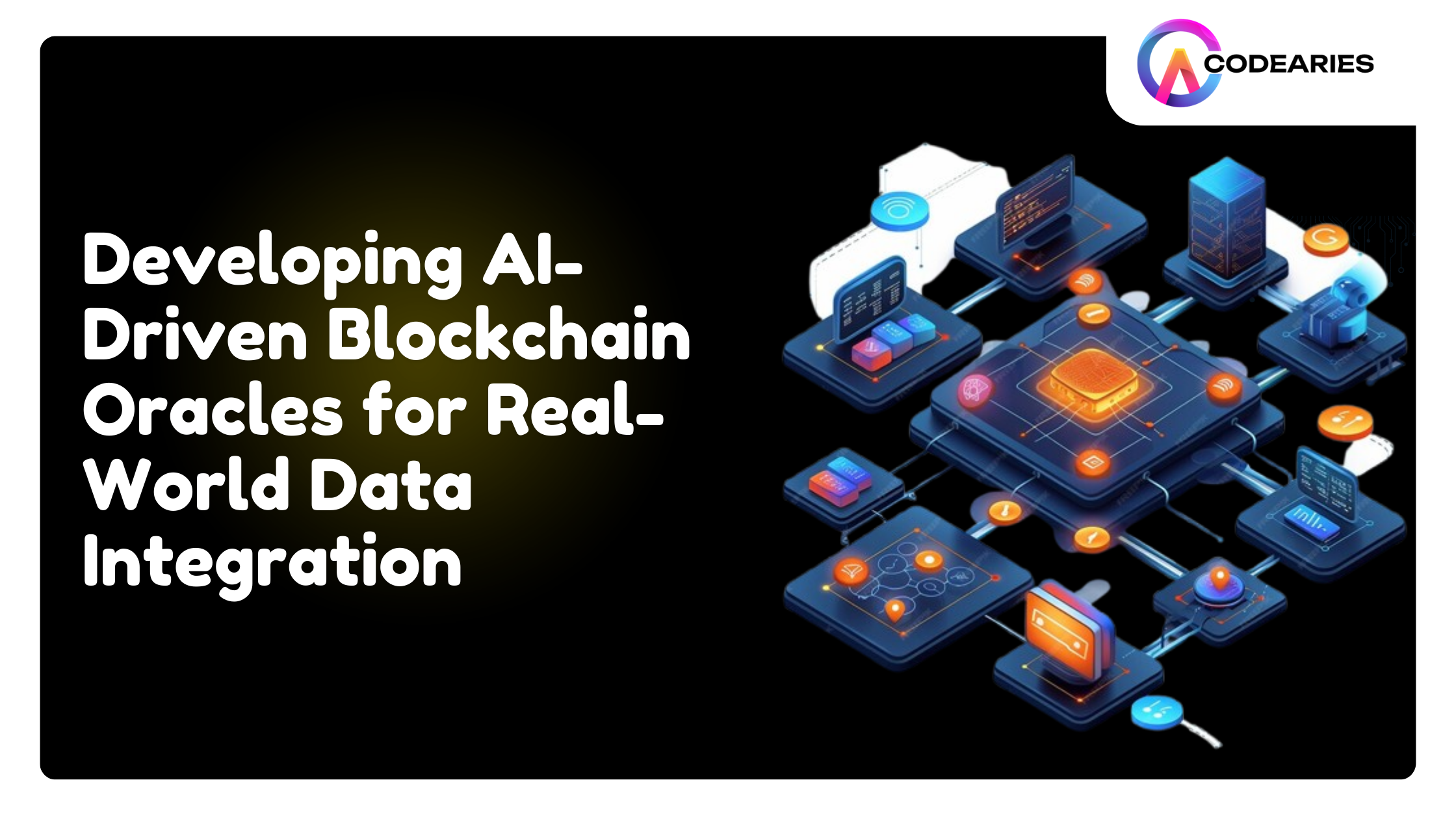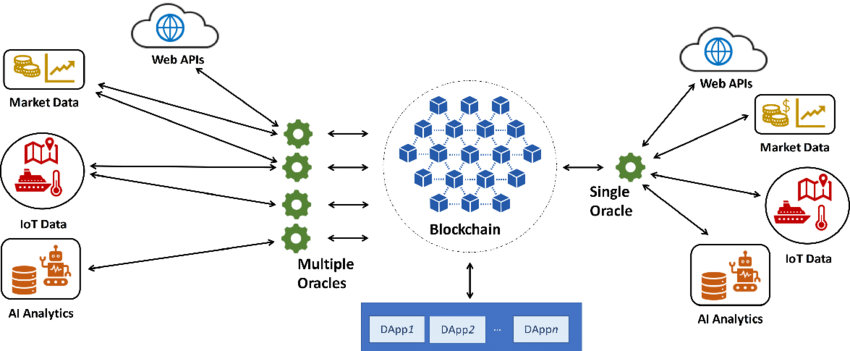
The convergence of artificial intelligence (AI) and blockchain technology drives innovation across multiple sectors, creating decentralized systems that offer improved transparency, security, and operational efficiency. One of the standout applications of this integration is the rise of AI-driven blockchain oracles, which play a crucial role in real-world data integration. Blockchain oracles act as intermediaries, enabling smart contracts to access and interact with off-chain data. However, accuracy, reliability, and speed issues often plague the integration of external data into decentralized systems. This is where AI comes into play, significantly enhancing the capabilities of blockchain oracles by boosting data verification, processing efficiency, and minimizing errors.
This article delves into AI-driven blockchain oracles, their significance in integrating real-world data, and their transformational impact on industries like finance, healthcare, supply chain management, and environmental monitoring.
What are AI-driven blockchain Oracles?
AI-enhanced blockchain oracles are critical gateways that bring real-world data into blockchain ecosystems. These oracles feed external information into smart contracts, enabling decentralized applications (dApps) to interact with off-chain data securely and reliably. The integration of AI within these oracles enhances their capabilities by allowing sophisticated data analysis and validation.
The global blockchain technology market size was valued at USD 17.46 billion in 2023 and is expected to grow at a compound annual growth rate (CAGR) of 87.7% from 2023 to 2030.
Types of Blockchain Oracles
Blockchain oracles can be categorized into different types based on their function:
- Inbound Oracles: These oracles fetch external data and deliver it to the blockchain.
- Outbound Oracles: These oracles send blockchain data to external systems.
- Consensus-Based Oracles: These oracles aggregate data from multiple sources to ensure reliability and accuracy.

How Do AI-Enhanced Oracles Function?
- Data Acquisition: Oracles gather information from diverse real-world sources such as financial markets, weather reports, and IoT sensors.
- AI-Driven Data Analysis: Artificial intelligence processes the raw data, identifying patterns and verifying its relevance and accuracy.
- Data Validation: AI models help ensure the integrity of the data, guarding against inaccuracies or manipulation before it is used.
- Data Delivery: After verification, the oracle transmits this trusted data to blockchain-based smart contracts.
Key Advantages of AI-Enhanced Blockchain Oracles
- Superior Accuracy: AI algorithms can analyze and filter out irrelevant or erroneous data, ensuring that only accurate, high-quality information is delivered to smart contracts.
- Increased Efficiency: Automation speeds up the entire data gathering and validation process, reducing the need for manual intervention and saving time and costs.
- Robust Security: AI can detect anomalies in the data that may indicate fraudulent behaviour, making the system more resilient to attacks or manipulations.
- Broader Application Spectrum: By leveraging AI’s advanced capabilities, blockchain oracles can support various use cases, from financial services to supply chain transparency.
The Role of AI in Enhancing Blockchain Oracles
Artificial Intelligence (AI) has dramatically transformed the functionality of blockchain oracles, elevating their performance in terms of efficiency, security, and data integrity. Below are the primary ways AI enhances blockchain oracles:
Ensuring Data Quality:
- Anomaly Detection: AI algorithms can identify irregularity in data sets, spotting inconsistencies that may indicate errors or manipulations. This helps prevent faulty data from entering the blockchain.
- Noise Filtering: AI can sift through vast amounts of information, eliminating irrelevant or misleading data points to ensure that only the most accurate and relevant data is passed to smart contracts.
Advanced-Data Analysis and Aggregation:
- Data Synthesis: AI can merge data from multiple independent sources, creating a more complete and trustworthy dataset that can be used for decision-making on the blockchain.
- Predictive Analytics: By analyzing historical data, AI algorithms can forecast future trends and behaviours, adding predictive capabilities to blockchain applications that rely on real-world data.
Automating Smart Contracts:
- Condition-Based Triggers: AI autonomously triggers smart contract actions when predefined conditions are met. This reduces the need for human oversight.
- Complex Decision Support: AI supports complex decision-making in smart contracts. It interprets intricate data to determine if contract conditions are fully met.
Boosting Security:
- Fraud Prevention: By continuously analyzing data streams, AI can identify suspicious patterns that may indicate fraud, such as sudden changes in market prices or tampering with external data feeds.
- Risk Evaluation: AI enhances the reliability of data by assessing the risk profiles of different data providers.
Real-Time Data Processing:
- Low-Latency Responses: AI-driven oracles excel in processing data in real time, allowing smart contracts to react instantaneously to changes in the external environment.
- Handling Large Data Volumes: AI systems are well-suited for managing large-scale data streams, enabling oracles to support blockchain applications that demand high throughput and fast decision-making.
Challenges in Traditional Blockchain Oracles
While blockchain oracles have revolutionized data integration in decentralized systems, traditional oracles still face significant challenges, including:
- Data Latency: The delay in acquiring real-time data affects the timing of smart contract execution.
- Trust Issues: Centralized oracles are susceptible to manipulation, reducing the trustworthiness of the data.
- Data Availability: Inconsistent or unreliable data sources can lead to gaps in data delivery
AI-driven oracles tackle these issues by applying machine learning techniques to enhance data accuracy, minimize latency, and ensure continuous trust in decentralized systems.
AI Solutions to Oracle Security Risks
Blockchain oracles are frequent targets for manipulation, particularly in high-stakes environments like decentralized finance (DeFi). AI significantly reduces security risks by monitoring and validating data in real-time, employing machine learning algorithms to detect anomalies and suspicious activity.In DeFi applications, where large sums of money are at stake, AI-driven oracles can safeguard financial systems by verifying data from multiple trusted sources and preventing tampering before it reaches the blockchain.
Smart Contracts and AI-Powered Oracles
The success of smart contracts depends heavily on the accuracy and timeliness of the data they receive. AI-driven blockchain oracles enhance smart contracts by providing reliable, real-time data, ensuring contract conditions are accurately met.
For example, in insurance, an AI-powered oracle verifies the occurrence of an event (like a natural disaster) from multiple data sources, automatically executing a claim only when it meets accurate conditions, thereby preventing fraudulent claims.
AI-Driven Blockchain Oracles: Transforming Multiple Industries
AI-driven blockchain oracles are revolutionizing industries by integrating real-time data with blockchain networks, enhancing transparency, efficiency, and security. From supply chain management to financial services, these oracles are enablingsmarter and more secure operations across various sectors.
Supply Chain Management
-
Enhancing Transparency and Efficiency
AI-driven oracles improve supply chain operations by integrating real-time data, enabling businesses to predict delays, optimize shipping routes, and track products throughout the logistics lifecycle.
-
Preventing Counterfeit Products
For industries like pharmaceuticals and luxury goods, AI oracles are crucial in validating product authenticity and ensuring the origin and integrity of goods from production to delivery.
Financial Services
-
Real-Time Data for DeFi and Financial Markets
In decentralized finance (DeFi) and financial markets, AI-driven oracles provide real-time data feeds for stock trading and cryptocurrency markets. By analyzing multiple data sources, these oracles help mitigate risks such as price manipulation.
-
Securing DeFi Transactions
By verifying data from trusted sources, AI oracles ensure that DeFi smart contracts are executed fairly, enhancing transparency and trust within the financial system.
Environmental Monitoring
-
Real-Time Integration for Resource Management
AI-driven oracles integrate data from sensors, satellites, and IoT devices to monitor environmental factors like climate change and resource management. This data is processed for carbon credit trading and water resource allocation.
-
Supporting Sustainability Efforts
Governments and organizations can leverage this real-time data to implement effective environmental policies and sustainability projects with accurate and reliable information.
Insurance
-
Automating Claims Verification
AI-powered oracles streamline insurance claims by cross-referencing real-world data—such as accident reports and weather conditions—to verify claims swiftly and accurately.
-
Reducing Fraud
By ensuring the accuracy of claims data, AI-driven oracles help prevent fraudulent claims, providing insurers with a more efficient and secure system for claims management.
Healthcare
-
Real-Time Data Integration
AI-driven blockchain oracles ensure accurate, real-time patient data integration from medical devices and electronic health records (EHRs). This enables healthcare professionals to make informed decisions quickly.
-
Supporting Medical Research
AI oracles can compile large anonymized datasets to fuel medical research, supporting advancements in personalized medicine and predictive analytics while maintaining data privacy.
Scalability and Real-Time Analytics
-
Handling Large Volumes of Data
As blockchain networks grow, AI-driven oracles scale efficiently by processing large data volumes through machine learning. This scalability is crucial for industries that depend on real-time decision-making.
-
Immediate Insights for Decision-Making
AI-driven oracles offer real-time analytics, helping businesses in finance, supply chain, and other sectors adjust strategies in response to living conditions. This enhances their agility and adaptability in rapidly changing environments.
Prediction Markets
-
Improving Forecast Accuracy
Prediction markets rely on accurate data for future forecasting. AI-driven oracles enhance this accuracy by analyzing historical trends and applying machine learning to predict outcomes, making them invaluable in sectors where forecasting is critical.AI-driven blockchain oracles are rapidly being adopted across various industries, including finance, healthcare, supply chain, and environmental monitoring. Their ability to provide accurate, secure, and scalable real-time data integration makes them essential for industries dependent on decentralized systems.
Elevating Blockchain Oracles with AI: Codearies’ Expertise
Codearies leads the field in AI-driven blockchain oracle development. We offer innovative solutions that use artificial intelligence to improve data integration and smart contract functionality. Our expertise in blockchain and AI technologies allows us to create oracles with superior accuracy and real-time data processing. We address challenges like data latency, trust issues, and security risks. Our AI-driven oracles ensure smooth interaction between blockchain networks and real-world data. Codearies delivers tailored solutions that optimize data verification, automate smart contract execution, and enhance operational efficiency across industries.
Book your free consultation now!
Conclusion
AI-driven blockchain oracles represent a major advancement in decentralized systems. They enable seamless integration of real-world data into blockchain networks. These oracles are transforming industries like finance, healthcare, and supply chain management by enhancing data accuracy, reliability, and security. As AI technology progresses, these oracles will become increasingly important, unlocking new possibilities for smart contracts and decentralized applications.
FAQS
How is AI used in Blockchain?
AI enhances blockchain through fraud detection, smart contract automation, predictive analytics, and decentralized decision-making, improving security, scalability, and performance.
What is Oracle in Web3?
An Oracle in Web3 links blockchains to external data sources, allowing smart contracts to react to real-world events. AI-driven oracles enhance data accuracy and automation.
What is Proof of AI Blockchain?
Proof of AI Blockchain
uses AI models to validate transactions or optimize blockchain performance, offering an alternative to traditional consensus mechanisms like proof-of-work.
What is Proof of Zero Blockchain?
Proof of Zero
uses cryptographic techniques to verify statements (e.g., account balance) without revealing details, enhancing privacy in blockchain transactions through zero-knowledge proofs (ZKPs).


